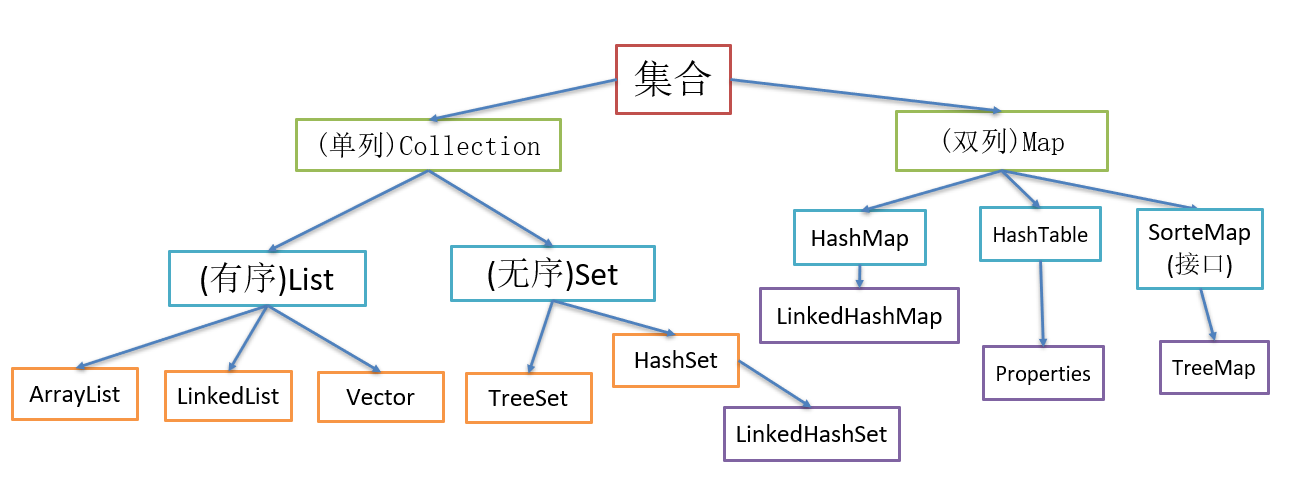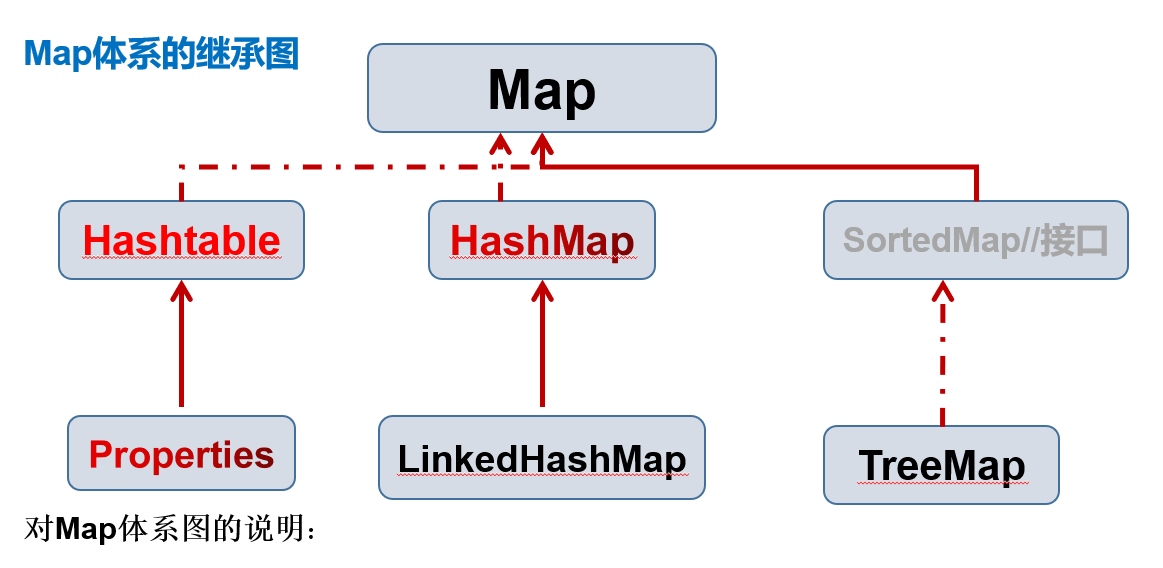
Java基础之:集合——Map
Map与Collection并列存在。用于保存具有映射关系的数据键值对:Key—Value
在Map中Key与Value都可以存放任何类型的数据。
Key是用Set来存放的,不允许重复,允许有null但只能有一个。常用String类作为Map的"键"(key)
Value是用Collection存放的,可以是Set也可以是List,所以当Value使用List时允许重复,且可以有多个null值。
key与value之间存在单向一对一关系,即通过指定key总能找到唯一的确定的一个value。
因为key是用Set存放的,而value是通过key进行查找返回的。所以Map是无序的。
底层结构图:

虚线为实现关系,实线为继承关系。

Map接口常用方法
put:添加
get:根据键获取值
size:获取元素个数
isEmpty:判断个数是否为0
containsKey:查找键是否存在
remove:根据键删除映射关系
clear:清除
package class_Map;import java.util.HashMap;import java.util.Map;public class ClassTest01_MapMethods { @SuppressWarnings({ "unchecked", "rawtypes" }) public static void main(String[] args) { Map map = new HashMap(); //put:添加。 /* 1.若要添加的key值集合中没有,则直接添加。 2.若集合中已存在相同的key值,则直接替换掉。 3.key中只能有一个null存在,若存在多个null则根据上面的规则,只会保留最后一个null 4.value中可以有多个null存在。 5.k-v是无序的,取出顺序和添加顺序是不一样的。 */ map.put("1", "hello01"); map.put("2", "hello02"); map.put("3", "hello03"); map.put("3", "hello05"); map.put("4", "hello02"); map.put(null, "hello02"); map.put("5", null); //get:根据键获取值 System.out.println(map.get("3"));//返回值:hello05 //size:获取元素个数 System.out.println(map.size());//返回值:6 //isEmpty:判断个数是否为0 System.out.println(map.isEmpty()); //返回值:false //containsKey:查找键是否存在 System.out.println(map.containsKey(null)); //返回值:true //remove:根据键删除映射关系,返回指为键所指的值 System.out.println(map.remove(null)); //返回值:hello02 //clear:清除 map.clear(); System.out.println(map); }}
Map接口的遍历方式
需要使用的方法:
containsKey():查找键是否存在
keySet():获取所有的键,返回一个Set集合
entrySet():获取所有关系,返回一个Set集合
values():获取所有的值,返回一个Collection集合
两种遍历方式(每种方式又分别有迭代器和增强for两种):
遍历键再通过键取出对应的值
直接遍历整个键值对k-v
package class_Map;import java.util.HashMap;import java.util.Iterator;import java.util.Map;import java.util.Set;public class ClassTest02_ForeachMap { @SuppressWarnings({ "rawtypes", "unchecked" }) public static void main(String[] args) { Map map = new HashMap(); map.put("1", "hello01"); map.put("2", "hello02"); map.put("3", "hello03"); map.put("3", "hello05"); map.put("4", "hello02"); map.put(null, "hello02"); map.put("5", null); //方式1:遍历键,再取出值 System.out.println("========方式一:迭代器======="); Set key = map.keySet(); //取出key,放入Set集合 //迭代器方式: Iterator iterator = key.iterator(); while(iterator.hasNext()) { Object obj = iterator.next(); //遍历键,将键赋值给obj System.out.println(obj + " == " + map.get(obj)); //通过键,访问值,进行遍历 } iterator = key.iterator(); //增强for循环方式: System.out.println("========方式一:增强for======="); for(Object obj:key) { System.out.println(obj + " -- " + map.get(obj)); } //方式二:直接遍历键值对 //将键值对放入Set中,此时entrySet编译类型为Set集合,运行类型为HashMap$Node("$"符号代表内部类,后面跟类名是内部类,跟数值是匿名内部类) Set entrySet = map.entrySet(); //取出键值对k-v,放入Set集合 //迭代器方式: System.out.println("========方式二:迭代器======="); Iterator iterator2 = entrySet.iterator(); while(iterator2.hasNext()) { //这里无法访问HashMap.Node,但Node实现了Map接口中的一个内部接口Entry,可以使用动态绑定机制// HashMap.Node node = (HashMap.Node)iterator2.next(); //报错:The type HashMap.Node is not visible /* 理解为什么需要是用Map.Entry来强转从entrySet中取出的键值对: 1.在HashMap中有内部类Node,用于保存键值对,但Node是静态成员内部类,不可以在外部访问,所以不能使用其get方法。 2.由于HashMap继承与Map接口,Node又实现了Map接口中的一个内部接口Entry。 3.即通过Entry接口就可以通过动态绑定的方式访问到Node内部类的方法 */ Map.Entry entry = (Map.Entry)iterator2.next(); System.out.println(entry.getKey() + " :: " + entry.getValue()); } iterator2 = entrySet.iterator(); //增强for循环方式: System.out.println("========方式二:增强for======="); for(Object obj:entrySet) { Map.Entry entry = (Map.Entry)obj; System.out.println(entry.getKey() + " .. " + entry.getValue()); } }}说明:直接遍历键值对所使用的动态绑定机制的思路和"OOP——内部类"最后的思考题相同。
Map接口练习
使用HashMap添加3个员工对象,要求
键:员工id
值:员工对象
并遍历显示工资>18000的员工
(遍历方式最少两种)
员工类:姓名、工资、员工id
package class_Map;import java.util.HashMap;import java.util.Iterator;import java.util.Map;import java.util.Set;public class ClassWork01 { @SuppressWarnings({ "unused", "rawtypes", "unchecked" }) public static void main(String[] args) { Map hashMap = new HashMap(); Employee employee1 = new Employee("小范", 1001, 22000); Employee employee2 = new Employee("小黄", 1002, 14000); Employee employee3 = new Employee("小雨", 1003, 23000); hashMap.put(employee1.getId(), employee1); //这里第一个参数employee1.getId()自动装箱,因为原本需要是Object类型 hashMap.put(employee2.getId(), employee2); //而取出来是Int类型,自动装箱为Integer。 hashMap.put(employee3.getId(), employee3); // System.out.println(hashMap); //遍历方式1:遍历键,再通过键,取出值 Set key = hashMap.keySet(); Iterator iterator = key.iterator(); while(iterator.hasNext()) { //将hashMap中的key键取出,放入Set中(实际是HashSet),再通过迭代器遍历取出key,通过hashMap.get方法取出值 Object obj = iterator.next(); //从HashSet中取出key键 , 此时key编译类型是Object,运行类型是Integer(因为键是员工id)// System.out.println(obj.getClass()); if(isOut(hashMap.get(obj))) { System.out.println(obj + "--" + hashMap.get(obj)); } } iterator = key.iterator(); System.out.println("========================================="); //遍历方式2:直接遍历键值对 //将键值对放入Set中,此时entrySet编译类型为Set接口,运行类型为HashMap$Node("$"符号代表内部类,后面跟类名是内部类,跟数值是匿名内部类) Set entrySet = hashMap.entrySet(); Iterator iterator2 = entrySet.iterator(); while(iterator2.hasNext()) { /* * 理解为什么需要是用Map.Entry来强转从entrySet中取出的键值对 * 1.在HashMap中有内部类Node,用于保存键值对,但Node是静态成员内部类,不可以在外部访问,所以不能使用其get方法。 * 2.由于HashMap继承与Map接口,Node又实现了Map接口中的一个内部接口Entry。 * 3.即通过Entry接口就可以通过动态绑定的方式访问到Node内部类的方法 */ Map.Entry node = (Map.Entry)iterator2.next(); if(isOut(node.getValue())) { System.out.println(node.getKey() + "==" + node.getValue()); } } iterator2 = entrySet.iterator(); } public static boolean isOut(Object object) { if(!(object instanceof Employee)) { return false; } Employee e = (Employee)object; return e.getSalary() > 18000; }}class Employee{ private String name; private int id; private double salary; public Employee(String name, int id, double salary) { super(); this.name = name; this.id = id; this.salary = salary; } public String getName() { return name; } public void setName(String name) { this.name = name; } public int getId() { return id; } public void setId(int id) { this.id = id; } public double getSalary() { return salary; } public void setSalary(double salary) { this.salary = salary; } @Override public String toString() { return "Employee [name=" + name + ", id=" + id + ", salary=" + salary + "]"; }}程序输出:
1001--Employee [name=小范, id=1001, salary=22000.0]
1003--Employee [name=小雨, id=1003, salary=23000.0]
=============================================
1001--Employee [name=小范, id=1001, salary=22000.0]
1003--Employee [name=小雨, id=1003, salary=23000.0]
原文转载:http://www.shaoqun.com/a/504105.html
贝恩投资公司:https://www.ikjzd.com/w/1336
捷汇:https://www.ikjzd.com/w/419
Java基础之:集合——MapMap与Collection并列存在。用于保存具有映射关系的数据键值对:Key—Value在Map中Key与Value都可以存放任何类型的数据。Key是用Set来存放的,不允许重复,允许有null但只能有一个。常用String类作为Map的"键"(key)Value是用Collection存放的,可以是Set也可以是List,所以当Value使用List时允许重复,且
google趋势:google趋势
acca是什么:acca是什么
2020鹏城花千谷油菜花节时间?深圳花千谷油菜花节门票多少:2020鹏城花千谷油菜花节时间?深圳花千谷油菜花节门票多少
亚马逊申诉模板范文10篇:亚马逊申诉模板范文10篇
春节旅游广州有什么好去处?:春节旅游广州有什么好去处?
No comments:
Post a Comment